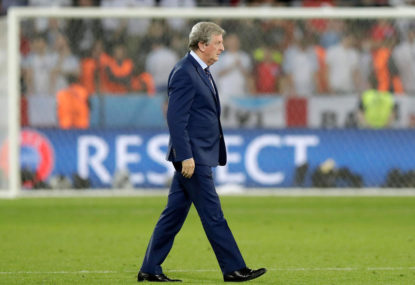LISTEN: 'You lost the league!' Everton fans troll Liverpool after denting Reds' title hopes
Everton won the Merseyside derby 2-0, with Toffees supporters taunting Liverpool after the game at their home ground Goodison Park.

The group stages of the European Championships boasted spectacular goals, terrific stories and countless ‘Will Grigg’s on fire’ chants through the streets of France.
We’ve learned some valuable lessons, some that could determine the outcome of the 2016 tournament.
1. The absence of a prolific goal scorer could bite the French
Much more was expected from France in terms of goals and attacking threat.
Their domination on the park has been aided by their ability to break on the counter, but they have missed the golden touch in the final third.
Arsenal striker Olivier Giroud has suffered a lot of criticism for being the man chosen to lead the hosts at the tournament.
Most fans would like to see Anthony Martial given an opportunity, or for omitted stars Alexandre Lacazette of Lyon and Kevin Gameiro of Sevilla to be recalled.
Manager Didier Deschamps’ decision not to include Lacazette or Gameiro in his squad for any internationals in 2016 may have been a mistake, given both contributed more goals and assists to their clubs in 2016 than Giroud or Andre-Pierre Gignac.
A prolific goal scorer is a top priority to survive at a major tournament and the lack of one could be the catalyst for Les Bleus’ premature exit.
Italy entered as write-offs, but they have a winning formula
I think of Italy’s gameplan at the Euros like the Great Wall of China: countless waves of Mongols attempt to scale the wall. After endless hours of trying to climb over, they retreat, only for a small garrison of Chinese archers to pop over the top and finish off their opponents.
Dutch legend Ruud Gullit praised the Italians for their efforts, against Sweden in particular.
Gullit certainly knows what he’s talking about, having captained one of the greatest-ever Dutch national teams to European glory in 1988.
One of the best defences in the entire competition, who all hail from Serie A Champions Juventus, and quick counter-attacking ability make for a compact and dangerous Italian setup that could go all the way.
The underdogs haven’t disappointed us so far
Hungary and Iceland did a terrific job in keeping Cristiano Ronaldo’s Portugal quiet. Chris Coleman led a rambunctious Wales team through the group stages to top Pool B. Northern Ireland shocked plenty by qualifying for the round of 16 off the back of captivating performances in Group C.
We all love an underdog story, it keeps people glued to their screens.
I can tell you about many people who have put money on Wales or Northern Ireland to go on and win the entire competition (they may have been marginally intoxicated at the time, but that’s just a part of the fun).
England needs to change management if this promising generation is to succeed
Most expected England to finish on top of Group B. Instead, they played out an underwhelming opening draw with Russia, managed a scrappy 2-1 win against Wales, then had a bore draw against Slovakia, limping to a second place finish.
Coach Roy Hodgson was berated by fans after their draw with Russia, as they screamed for the pace and energy Jamie Vardy and Danile Sturridge would provide. Instead, Jack Wilshere and James Milner were summoned.
England’s most prolific striker over the past two seasons, Harry Kane, was bafflingly deployed on the right flank. When Hodgson made five changes to the side that defeated Wales for the group-defining Slovakia match, we weren’t surprised to see them finish runners-up.
This team has plenty of promise, but Hodgson’s lack of composure, strange player choices, and a lack of consistency in his squad have stifled England.
The expansion of the competition has worked well
The surprise teams that qualified due to the expanded competition – like Albania, Hungary, Iceland, Northern Ireland and Wales – haven’t disappointed, providing some great action over the past week and a half.
The new format provides a more competitive environment, while the new competition rules allow for the third-placed teams to qualify for the round of 16.
This also means there were no dead rubber matches in the group stage.
The expansion offers more excitement and competitiveness among the groups, and diversification of nations.
The round of 16 begins this Saturday at 11pm (AEST), with Switzerland taking on Poland.